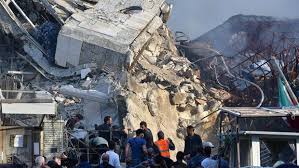On Sunday, Iran initiated its inaugural direct assault on Israel, following an airstrike on its embassy in Damascus just days prior. Employing a combination of drones and missiles, Iran targeted Israel, heightening tensions in the already strained Middle East, compounded by the ongoing conflict in Gaza. In response, the United States has reiterated its unwavering backing for Israel’s security, pledging assistance in defense against Iranian threats.
Israel has formally appealed to the United Nations Security Council to convene an emergency session to denounce Iran’s aggression.
Here are the latest developments in the Israel-Iran conflict:
- Iran’s Attack on Israel: Iran launched a coordinated assault involving over 200 drones, ballistic missiles, and cruise missiles towards Israel. Israel’s defense system successfully intercepted most of the incoming projectiles, but casualties and damage occurred, including injuries to a girl and damage to a military base.
- Iran’s Justification: Iran cited the attack as retribution for what it termed “Israeli crimes,” specifically referring to the airstrike on its consulate in Damascus on April 1, which resulted in the deaths of seven elite officers, including generals. Despite Iran’s accusations, Israel neither confirmed nor denied its involvement in the Damascus consulate attack.
- Iran’s Warning and Response: Iran issued a warning, asserting that if Israel made another “mistake,” its response would be significantly more severe. Additionally, Iran cautioned the United States to refrain from involvement, indicating that the matter should be considered concluded.
- International Responses: US and British warplanes intercepted Israel-bound drones over the Iraq-Syria border, while Jordan defended its airspace against violating drones. Israel’s military spokesperson labeled the attack as a serious escalation, emphasizing the readiness of defensive and offensive capabilities. Israeli Prime Minister Benjamin Netanyahu convened a war cabinet meeting, underscoring Israel’s readiness for any scenario, both defensively and offensively.
- Iranian Perspective: Iran’s Revolutionary Guards confirmed their involvement in the attack, framing it as a response to perceived Israeli aggression and crimes against Iran. Iran’s defense minister warned countries against facilitating attacks on Iran by Israel, promising a firm response to any such actions.
- Iranian Perspective: Iran’s Revolutionary Guards confirmed their involvement in the attack, framing it as a response to perceived Israeli aggression and crimes against Iran. Iran’s defense minister warned countries against facilitating attacks on Iran by Israel, promising a firm response to any such actions.
- International Condemnation: British Prime Minister Rishi Sunak condemned Iran’s actions as reckless and destabilizing, emphasizing the risk of further escalation and the need to prevent more bloodshed. Germany, France, and the European Union joined in condemning Iran’s attack, describing it as an unprecedented escalation and a grave threat to regional security.
- UN Secretary-General’s Statement:
- UN Secretary-General Antonio Guterres strongly condemned the escalation, calling for an immediate cessation of hostilities, stressing the global imperative to avoid another war in the region.


















